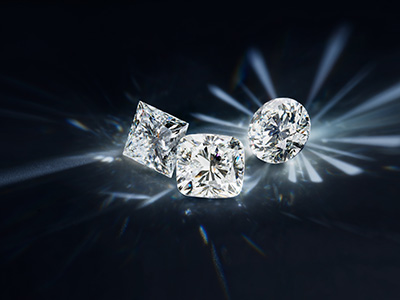
In 2016, Bain Capital Private Equity announced it was buying e-tailer Blue Nile and taking it private. Now, as we near the two-year anniversary of that announcement, the company’s chief financial officer Bill Koefoed (pictured) talks with JCK what has changed, its plans for the future, and, of course, lab-grown diamonds.
JCK: What has been accomplished since Bain purchased Blue Nile?
Bill Koefoed: Bain bought the company to reignite [our] growth and take advantage of operational efficiencies that they identified through their due diligence process, including reexamining the sourcing and the vendors that we used. We have done really well with that. We have reignited our growth in the U.S. We’re well on our way.
What changes have been made since Bain came aboard?
We have redone our site. We invested a lot to do that. The site was dated and somewhat stale. We have upgraded it and made it more modern. We have improved the diamond visualization, and we want to keep working on that.
You saw the press announcement we did around our call center. We want to invest in our team. We think it’s part of our value proposition to offer people great service as well as a great online experience.
A pretty huge percentage of our customers end up calling the call center. We have some really experienced people. We just celebrated 15-year anniversaries of some DJCs [diamond jewelry consultants]. We believe the discovery and validation process is key to the engagement buying experience.
How is it different being a private company?
When we were a public company everything was in the public eye. Now we are private, we can test and learn and we’re doing that. One of the great things the board now asks us is, “What did you learn from this?” We are doing a lot of learning and growing. I think you will see us in the public markets again in a few years when we get the rocket ship going.
Anything else you have planned?
Our aspiration is to be the world’s leading personal jeweler. I think we have a great vision to get there. Historically, we have been very transaction oriented. We often hear from people who bought an engagement ring from us that “it was great, and then I never heard from you guys.” You will see us doing a lot more to cultivate relationships with our customers. You will see a lot more of that messaging.
For a while, Blue Nile was introducing designer brands. Will that continue?
We did launch our Astor brand about a year ago. It’s an incredibly beautiful diamond, and the folks at GemEx are really excited about it. We have good success with it. As with any brand launch, it takes a little while to get off the ground. We’re quite optimistic.

What is Blue Nile’s view of lab-grown diamonds?
We are a retailer. We sell what customers want to buy. We are evaluating it and looking to see where the market goes. We don’t do any lab-grown diamonds at this point. It wouldn’t be too complicated for us to pivot there.
For a while, Blue Nile was really focused on opening webrooms. But you haven’t opened one in a year. Do you expect to open more?
We currently have six. I don’t expect we will open another webroom in 2019. Most of the showrooms were opened up in malls. I think that a logical read of the state of the U.S. retail would say that malls are not the future.
We don’t expect to be quite as focused on malls as we were. We want to be where customers are. We are revisiting this. It’s part of the research we are doing right now.
Do you expect to have any kind of brick-and-mortar presence?
If it makes sense, we will for sure do it. I should say that some of our mall stores are doing really well, and some malls are doing really well.
What kind of marketing are you planning? Do you expect more TV advertising?
We did a decent amount of television advertising last holiday and through the spring. I can say the ROI [return on investment] wasn’t what we had hoped for. Digital marketing has been our most efficient and best advertising medium. We are continuing to explore how we can reach consumers in an efficient and effective way.
How do you see the landscape for jewelry e-commerce?
We’re in Seattle with Amazon, so we see a lot on the news about e-commerce. E-commerce is supposed to be up from 15 to 18 percent year over year. Engagement jewelry is still a relatively unpenetrated category for e-commerce. We certainly think that the market will be up from 15 to 18 percent. Hopefully, we’ll get a fair share of that.
How has the Supreme Court’s ruling on sales tax affected you? [Editor’s note: Blue Nile now collects sales tax in 25 states, versus three before the ruling.]
It obviously affects everybody. It hasn’t specifically impacted our business. Even in the states charging sales tax, the value proposition is still quite compelling versus our competitors.
Talking about competitors, how do you see the competitive landscape as far as competitors like Amazon and James Allen?
As you know, the biggest portion of the jewelry business remains brick- and-mortar. That is where the vast majority of the market is. We are not burdened by real estate, we are not burdened by a lot of infrastructure that some of our competitors are, including the largest, who just announced they are closing a lot of stores.
Amazon does sell jewelry, but they don’t do it the same. They don’t do a similar high-touch high-experience offer. James Allen has been a good competitor. They were acquired by a brick-and-mortar company [Signet]. We’ll see what the future holds for them and how they integrate. They have had a generally good integration. We’ll see how it goes.
You are a relative newcomer to the business. [Editor’s note: He joined in March.] What are your impressions of the jewelry business?
My background is in software. I spent nine years at Microsoft and then some software startups. It’s a fascinating industry. I went to JCK Las Vegas. It’s an industry that has incredible history. It has one of the most compelling products. You can see it and feel it and touch it and just see how beautiful the products are.
We hired a new chief merchant, Katie Zimmerman, who came from Zales. She has really added an eye to our assortment. She will bring stuff to my office, and it’s a lot more fun than infrastructure.
We pay a lot of attention to the trade talk, and we have some good partners that we work with. It’s a fascinating industry, and I have lots to learn.
(Photos courtesy of Blue Nile)
Follow JCK on Instagram: @jckmagazineFollow JCK on Twitter: @jckmagazine
Follow JCK on Facebook: @jckmagazine